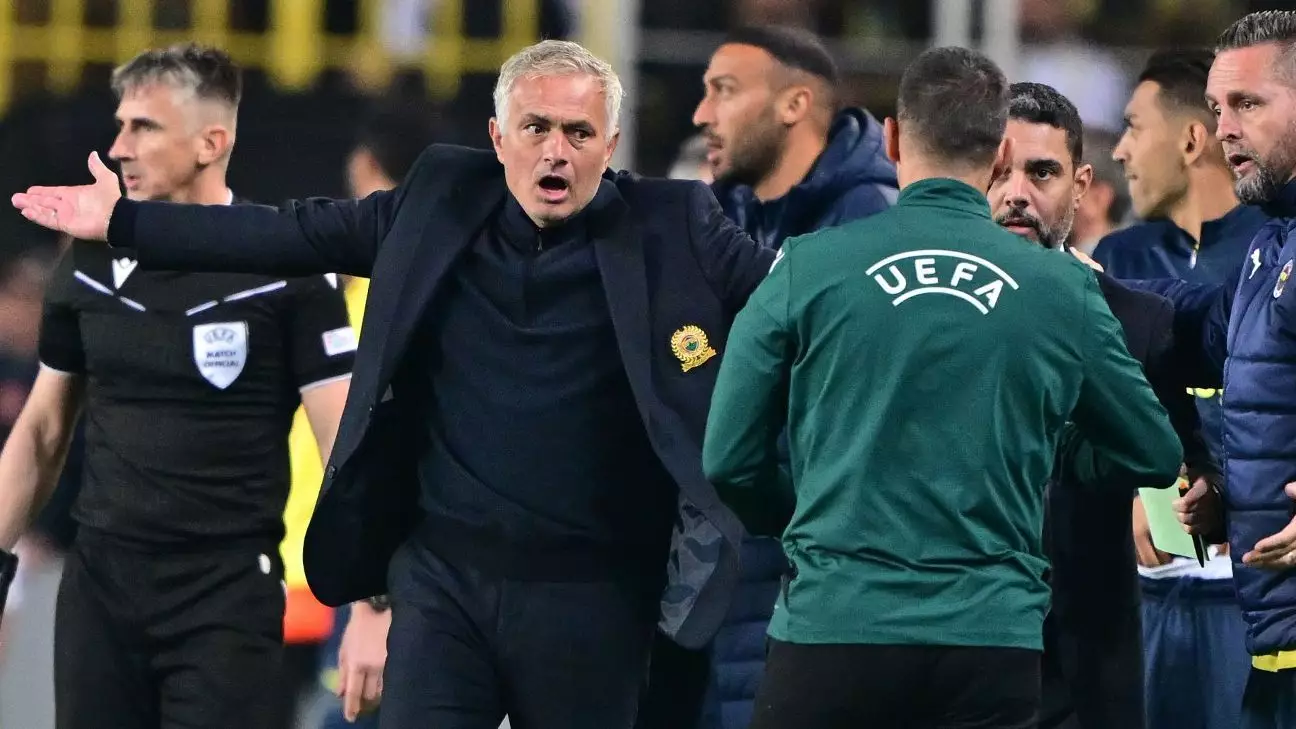Jose Mourinho, a name synonymous with football glory and controversy, has recently voiced concerns over the treatment he has received from UEFA, especially following his previous tenure with AS Roma. The seasoned coach, now leading Fenerbahce, appears to feel unfairly scrutinized and penalized by European football’s governing body, a sentiment that raises questions about the psychological burden placed upon high-profile managers in the sport today.
A Troubling Aftermath of the Europa League Final
Mourinho’s frustrations stem largely from the events surrounding the 2023 Europa League final, where his team faced Sevilla. The match, which ended in a penalty shootout defeat, turned sour not only for the players but for Mourinho himself, who was subsequently handed a four-match touchline ban for his outburst against referee Anthony Taylor. Such incidents are not uncommon in high-stakes matches, yet the manner in which they are addressed can disproportionately affect managers with rich histories in football like Mourinho. He articulated his feelings in an interview with Sky Sports, stating, “I lost a final in a way that I still don’t accept, and since then I feel it.”
This sentiment is a manifestation of a larger issue in professional sports where the emotional toll of high-pressure situations can lead to reactive behaviors that later warrant punishment. Mourinho’s perspective reflects a personal crisis that resonates with many competitive athletes and coaches—the juxtaposition of passion and professionalism.
Mourinho insists on the need for equitable treatment across the board, stating, “I deserve to be treated like everybody else.” His analogy that the same rules should apply to coaches of all backgrounds, from the legendary Carlo Ancelotti to a novice manager, underscores a fundamental principle of fairness in sport. It challenges the governing bodies to prioritize consistency in how they enforce regulations, considering the emotional stakes involved.
The issue is complicated by the media narrative that often surrounds Mourinho. As a figure who has faced scrutiny for his fiery temperament and controversial statements throughout his career, the question arises whether his past actions have led to an environment where he is treated with less leniency than others. The notion of “celebrity punishment” in sports—where renowned figures may be penalized more severely due to their status—merits examination.
Mourinho’s remarks post-match against Manchester United indicate his contemplation of future ventures, revealing a sense of disillusionment with the pressures of European competitions. He quipped about his next managerial role aligning more with English clubs that are not participating in UEFA tournaments. This has sparked discussion about the evolving nature of his career—is he contemplating a step back from the intense spotlight of European football? His statement about not wanting to fight relegation, as he finds that particularly challenging, unveils another layer of his mindset.
“I believe that has to be the hardest thing,” he noted. This acknowledgment of the emotional strain associated with relegation battles indicates maturity in his approach to management. One could argue that Mourinho, who has consistently been at the pinnacle of football, now seeks a balance between competitiveness and personal well-being.
Despite expressing misgivings, Mourinho has not closed the door on returning to the Premier League—a league that holds a special place in his journey. “London is home,” he stated. This sentiment resonates not just as a geographical preference but as an emotional anchor in his storied career. The allure of returning might include not only the nostalgia of former clubs like Chelsea and Manchester United but also the opportunity to reshape his legacy.
Mourinho’s path in football has often clouded him with controversy, but it’s also characterized by resilience and reinvention—qualities that any successful manager must possess. As he navigates the highs and lows of contemporary football, his story serves as a poignant reminder of the emotional complexities surrounding leadership in a sport that thrives on competition, public scrutiny, and the relentless pursuit of victory.
As Mourinho continues with Fenerbahce, the football world will undoubtedly remain abuzz with the tales from his managerial journey, hoping to witness a narrative of transformation and renewed success.

Leave a Reply